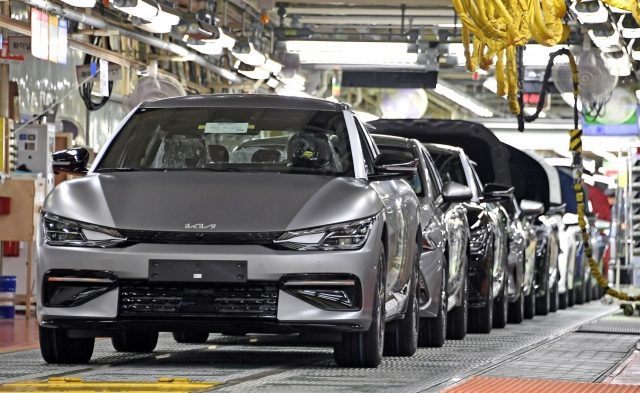Kia to build first new Korean factory in 26 years
New plant to produce 200,000 vehicles annually from July 2025
By Byun Hye-jinPublished : Jan. 17, 2023 - 15:36

Kia, an affiliate under the leading carmaker Hyundai Motor Group, said Tuesday it has decided to build a new car plant in South Korea, an outcome of yearslong negotiations with its labor union.
With the construction set to start in the first quarter of this year, the upcoming plant will become Kia’s first new factory to be built in Korea in 26 years.
Kia and the labor union agreed on producing 200,000 electrified purpose-built vehicles a year in the long term, gradually expanding production lines from 50,000 vehicles.
Scheduled to start production in July 2025, PBVs include electrified buses and shuttle service vehicles and even future mobility vehicles like robot taxis and portable offices, according to a Kia official.
In May, Kia vowed to become the No. 1 brand worldwide for purpose-built vehicles, in line with Hyundai’s EV transition strategy.
The electrified PBV factory will adopt innovative technologies that minimize carbon emissions.
Last year, Kia unveiled its plan to inject some 1 trillion won ($805.3 million) into PBVs after constructing a new factory by 2023 with an annual production target of 150,000 units. But it faced criticism from the labor union, who argued it should expand the target to 200,000 and secure more jobs for factory workers.
Kia and the labor union also decided to make pickup trucks powered by internal combustion engines in one of the three Hwaseong factories by Dec. 2024.
The automaker will be producing its first pickup truck model in 43 years since it discontinued the Brisa model in 1981, targeting the domestic market.
The parent company Hyundai Motor Group produces and sells Santa Cruz models only in the US. Among local car manufacturing companies, KG Mobility, previously known as SsangYong Motors, is the only one that makes pickup trucks.
Sources say the trucks are likely to be produced at the first Hwaseong factory, which makes the compact sedan K3 and flagship sports utility vehicle models, including the Sorento and Mohave. The labor union has been demanding the company allocate additional production lines for a new model, since the K3 and Mohave are expected to be discontinued.
“Although pickup trucks have been considered to appeal to a small customer base, demand for the light-duty vehicles is growing quickly in global markets and likely to increase in here as well,” said the official.
The two also struck a deal to produce EV powertrains, such as motors and electric power controllers.
But experts say that the company and the labor union might be aiming too high for rolling out eco-friendly PBVs.
“Although PBVs are expected to account for 30 percent of the total vehicles by 2030 worldwide, it would have been reasonable to lower the target production volume from 200,000 to 150,000 units,” said Kim Pil-su, an automotive engineering professor at Daelim University. “Even Tesla is currently facing oversupply issues (with its gigafactory in Shanghai) due to a demand shortage.”
Kim also said pickup trucks might not garner enough traction from Korean consumers. “Unlike the US, which sells millions of pickup trucks annually, Koreans prefer regular cars or luxury cars to PBVs,” he said.
Kia is currently converting one of its two factories in Gwangmyeong, Gyeonggi Province, to an EV factory. Its Gwangju factory has decided to begin making electrified SUVs from 2025. Hyundai also plans to build a new factory for EVs in Ulsan at the same time.
Starting from this year, the carmaker plans to launch more than two EV models, with its large SUV model called EV9 waiting for its grand unveiling. By 2027, it looks to update its EV lineups with a total of 14 models, including an electrified pickup truck model and another model exclusively for the ASEAN region and emerging markets.
With Kia ramping up its EV initiative, Hyundai Motor Group’s plan to expand EV annual production from last year’s 350,000 to 1.44 million by 2030 seems to be gaining momentum, sources said. The two carmakers vowed to pour 21 trillion won into EV business in the cited period.








![[Graphic News] More Koreans say they plan long-distance trips this year](http://res.heraldm.com/phpwas/restmb_idxmake.php?idx=644&simg=/content/image/2024/04/17/20240417050828_0.gif&u=)
![[KH Explains] Hyundai's full hybrid edge to pay off amid slow transition to pure EVs](http://res.heraldm.com/phpwas/restmb_idxmake.php?idx=644&simg=/content/image/2024/04/18/20240418050645_0.jpg&u=20240419100350)






![[From the Scene] Monks, Buddhists hail return of remains of Buddhas](http://res.heraldm.com/phpwas/restmb_idxmake.php?idx=652&simg=/content/image/2024/04/19/20240419050617_0.jpg&u=20240419175937)

![[KH Explains] Hyundai's full hybrid edge to pay off amid slow transition to pure EVs](http://res.heraldm.com/phpwas/restmb_idxmake.php?idx=652&simg=/content/image/2024/04/18/20240418050645_0.jpg&u=20240419100350)

![[Today’s K-pop] Illit drops debut single remix](http://res.heraldm.com/phpwas/restmb_idxmake.php?idx=642&simg=/content/image/2024/04/19/20240419050612_0.jpg&u=)